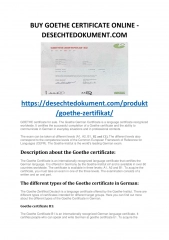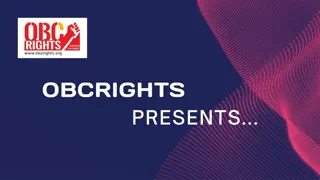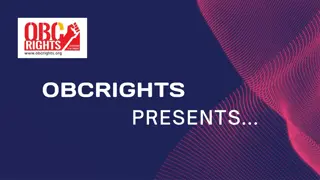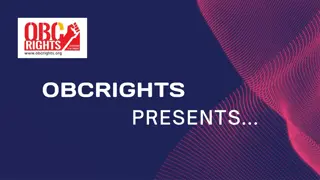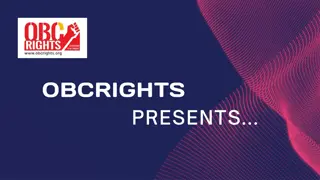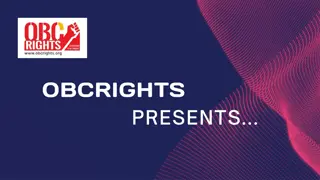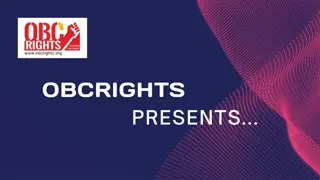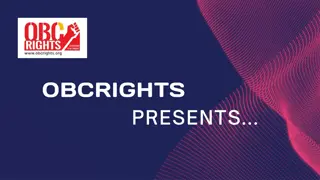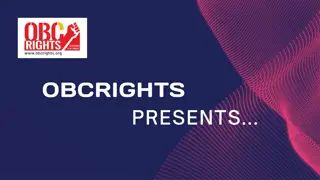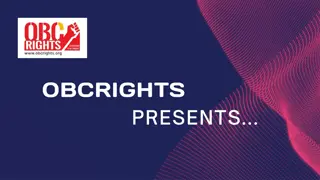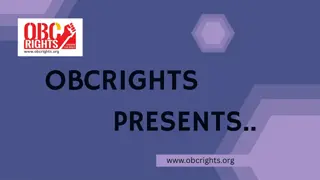National Senior Certificate Update
Matric Class of 2023 in the Western Cape Education Department faced various challenges due to the impact of the COVID-19 pandemic, including disruptions to curriculum delivery, teacher coverage, and assessment protocols. The cohort also experienced rotational attendance, amended assessment requirements, and trimmed curriculum, affecting their education journey. Despite these obstacles, they received support from educational programs in their path to the National Senior Certificate examination.
Download Presentation

Please find below an Image/Link to download the presentation.
The content on the website is provided AS IS for your information and personal use only. It may not be sold, licensed, or shared on other websites without obtaining consent from the author. Download presentation by click this link. If you encounter any issues during the download, it is possible that the publisher has removed the file from their server.
E N D
Presentation Transcript
Western Cape Education Department National Senior Certificate Update STANDING COMMITTEE MEETING HAROON MAHOMED 22 February2024
The profile of the Matric Class of 2023 The Matric Class of 2023 exited the General Education and Training phase in 2020 (Grade 9). This is the 4th matric cohort to be exposed to the negative impacts of the COVID-19 pandemic in terms of curriculum delivery, teacher coverage, learner coverage and assessment protocols. This cohort attended faced the challenges of loadshedding during classroom time, which impacted upon the teaching of power aided subjects such as CAT, ICT, Hospitality Studies and various Technical Subjects. This also impacts negatively on homework and self study. 2
The profile of the Matric Class of 2023 The Matric Class of 2023 was subjected to a trimmed curriculum at the exit point of the GET phase (Grade 9), as well as, at the entry point of the FET band (Grade 10). In Grade 9 the reduction of subject content limited the background knowledge required for subject choices in Grade 10. This cohort experienced rotational attendance in Grade 9 and 10 and full attendance in Grade 11 (2022) and in Grade 12. They experienced amended assessment requirements in Grades 9,10 and 11, with examinations replaced by school based controlled tests. The cohort was not fully exposed to standardized assessments or examinations in Grades 10 and 11. 3
The profile of the Matric Class of 2023 Fortunately, the Matric Class of 2023 started grade 11 (2022) in an environment of relaxed COVID-19 regulations with no rotational school attendance. They completed the Annual Teaching Plans (ATPs) a sign of recovery. The cohort also benefitted from the many educational support programmes and resources provided by the WCED. 4
Size of the examination Category Number 2023 Full Time NSC Candidates 64 190 12643 2023 Part Time NSC Candidates 1767 2023 FT Progressed learners 1944 82 2023 Number of immigrants 2023 Number registered for special needs *5 subjects endorsed NSC TOTAL 76833 5
Marking of the 2023 examinations Staggered marking took place from 05 December 2023 - 21 December 2023 at the 11 venues: CTLI, Western Cape Sports School, De Kuilen High, Brackenfell High Durbanville High, Wynberg Boys High, Wynberg Girls High, SACS, Groote Schuur High and Rondebosch Boys High. Some subjects were marked centrally at DBE: Agricultural Management Practices, Agricultural Technology, Music, Dance, SA Sign Language HL. English SAL & isiXhosa SAL marked in WC Markers wrote competency tests in 13 subjects: Accounting, Business Studies, Consumer Studies, Economics, English Home Language, Geography, History, Life Sciences, Mathematical Literacy, Mathematics , Physical Sciences, isiXhosa Home Language & Afrikaans Home Language 6
Marking of the 2023 examinations Marking position Number of markers 2019 76 68 Number of markers 2020 74 73 Number of markers 2021 65 61 Number of markers 2022 75 72 Number of markers in 2023 76 73 Chief Markers Internal Moderators Deputy Chief Markers Senior Markers Markers Total 103 98 105 129 149 592 3 414 4 253 489 2 397 3 131 517 2 902 3 650 558 2 899 3 046 725 3596 4619 7
Summary of overall results for the NSC (2019-2023) DESCRIPTION / BESKRYWING 2019 2020 2021 2022 2023 Number of candidates who correctly wrote full examination/ Getal kandidate wat volle eksamen korrek afgel het 50 404 51 633 57 709 60 338 62 077 21 981 22 634 26 125 25 761 26 182 Number and % Getal en % Bachelors Degree / B-Graad 43.6% 43.8% 45.3% 42.7% 42.2% National Senior Certificate with access to Higher Education / Nasionale Senior Sertifikaat met toegang tot Ho r Onderwys 13 006 12 444 13 629 15 247 15 585 Diploma / Diploma 6 477 6 141 7 090 8 071 8 825 Certificate / Sertifikaat 38 31 30 23 28 Endorsed Certificate / Ge ndoseerde Sertifikaat NSC passes without access to Higher Education / NSS geslaag sonder toegang tot Ho r Onderwys 0 0 1 0 0 41 502 41 250 46 875 49 102 50 620 Total number of passess / Totale getal geslaagdes 82.3% 79.9% 81.2% 81.4% 81.5% Percentage pass rate / Slaagpersentasie 8
Mathematics and Physical Sciences DESCRIPTION / BESKRYWING 2019 2020 2021 2022 2023 Number wrote Number of Candidates who wrote and passed Mathematics 15 420 14 323 15 219 15 616 15 524 10 724 10 140 11 026 10 602 11 702 Number passed 69.5% 70.8% 72.4% 67.9% 75.4% Number of Candidates who wrote and passed Mathematical Literacy Number wrote 35 126 37 161 42 272 44 544 46 294 29 063 30 788 33 381 39 151 38 148 Number passed 82.7% 82.9% 79.0% 87.9% 82.4% 39 787 40 928 44 407 49 753 49 850 Mathematics and Mathematical Literacy TOTAL Number passed 78.7% 79.5% 77.2% 82.7% 80.6% Percentage that wrote Mathematics Wrote 30.5 27.8 26.5 26.0 25.1 Number wrote 9 983 9 463 9 801 9 818 10 082 Number of Candidates who wrote and passed Physical Sciences 8 016 7 086 7 555 7 958 8 288 Number passed 80.3% 74.9% 77.1% 81.1% 82.2%
Enrolment stats NSC 2023 (90%+ of cohort enrolled for listed subjects) SUBJECT DESCRIPTION FT % of cohort FINAL % Pass 100,00% 73,69% 60,29% 45,97% 44,02% 40,54% 39,70% 39,52% 35,92% 32,60% 30,28% 28,93% 25,1% 17,80% 15,85% 15,84% 14,91% 10,84% 6,87% Life Orientation Mathematical Literacy English First Additional Language History Life Sciences Business Studies English Home Language Geography Afrikaans First Additional Language Afrikaans Home Language Tourism IsiXhosa Home Language Mathematics Computer Applications Technology Physical Sciences Consumer Studies Economics Accounting Engineering Graphics and Design 64190 47299 38702 29511 28255 26025 25481 25368 23054 20928 19437 18570 15701 11423 10176 10168 9570 6958 4408 100% 82% 100% 80% 68% 77% 93% 83% 96% 95% 99% 99% 75% 91% 82% 98% 75% 75% 90% 10
Provincial Inclusive Basket % Physical Science Achieved % Technical Mathematics % Distinctions Achieved % Maths Participation % Accounting Achieved % Maths Achieved % Throughput % Bachelors % Achieved PROVINCE EASTERN CAPE 81.4% 76.7% 57.4% 75.0% 78.0% 45.0% 39.6% 4.2% 68.3% FREE STATE 89.0% 81.5% 69.9% 80.2% 94.7% 37.3% 44.8% 3.5% 55.3% GAUTENG 85.4% 78.1% 69.1% 77.9% 93.9% 33.5% 44.3% 4.6% 66.5% KWAZULU-NATAL 86.4% 75.7% 64.1% 77.8% 95.2% 38.6% 45.7% 8.2% 65.9% LIMPOPO 79.5% 77.1% 60.2% 77.1% 88.5% 47.9% 36.4% 3.6% 62.5% MPUMALANGA 77.0% 75.5% 58.1% 68.4% 92.0% 42.8% 33.3% 3.3% 72.2% NORTH-WEST 81.6% 76.3% 66.7% 76.4% 80.4% 26.9% 36.4% 3.4% 59.1% NORTHERN CAPE 75.8% 72.2% 57.0% 67.2% 87.9% 21.2% 30.0% 1.7% 57.0% WESTERN CAPE 81.5% 74.9% 75.4% 82.2% 87.2% 25.0% 42.2% 5.6% 71.6% NATIONAL 82.9% 76.8% 63.5% 76.2% 88.5% 37.9% 40.9% 5.1% 65.6% 11
Success indicator: retention rate Of the 64 112 candidates who registered for the examination 62 077 wrote the full examination correctly, thus reflecting the highest turn-out rate of 96.8% (97%) (2022 96.7%) since 2015. 1 773 progressed candidates registered to write the exam and 1 514 (85.4%) wrote, of which 21.5% passed. Pass rate without progressed learners; 83,0% and 43.2% B-degree passes. Incompletes: 3,2% (medical, SBA outstanding). 12
Success indicator: Number of passes The number of candidates who correctly wrote the full examination has increased as follows: - 2019 : 50 404 - 2020 : 51 633 - 2021 : 57 709 - 2022 : 60 338 - 2023: 62 077 This resulted in an increase in the number of candidates who sat for the in November 2023 NSC examination by 11 673 candidates over the five-year period. 13
Success indicator: Quintiles Quintiles enrolment was as follows: - Q1: 4357 of 4532 wrote (96%) - Q2: 5861 of 6216 wrote (94%) - Q3: 11 441 of 11 925 wrote (96%) - Q4: 13 383 of 13 927 wrote (96%) - Q5: 24 420 of 24 827 wrote (98%) Q1- 3 schools achieved an increase in pass rate from 2022 and an increase in the Bachelor degree passes and number of passes. Q4-5 schools achieved a decrease in pass rate and Bachelor- degree passes. However, enrolment was higher and therefore the number of passes are higher in these two categories. Q2 and Q3 schools are outperforming Q4 schools in both pass rate and Bachelor-degree pass rate, with Q1 schools achieving a higher Bachelor- degree pass rate. 14
Success indicator : Home Language selection Enrolment in three of four Home Language groups: Proportional breakdown of cohort that wrote; Afrikaans 32%, English 39%, isiXhosa 28%. Turn out rate: Afrikaans turnout rate was 19 555 of 20 169 (97%) registered candidates and the pass rate for this group dropped from 79,3% in 2022 to 78% in 2023; English turnout rate was 23 903 of 24 455 (98%) registered candidates and the pass rate for this group is 86.2%; Xhosa turnout rate was 17 552 of 18 397 (95%) registered candidates and the pass rate for this group increased from 74,5% in 2022 to 78.4% in 2023. 15
Number of schools that achieved under 60% pass rate (Public Ordinary) Education District Number of schools achieving less than 60% Cape Winelands Eden and Central Karoo Metro Central Metro East Metro North Metro South Overberg TOTAL 14 schools 1 school 2 schools 2 schools 2 schools 7 schools 1 schools 29 schools 16
Risk mitigation: 2024 Track completion of School Based Assessment, Orals and Practical Assessment Tasks from the start of the academic year. Profile our schools differentiated support strategy. Under-performing schools discuss approaches across districts. Learners at risk must be identified early and supported not only in academics. Investigate the strategies to improve Home Language performance. Mathematics participation rate impact lower down in the system. Utilization of resource material language across the curriculum. Feedback from marking process utilize diagnostic reports. 21
Special Programmes and activities to ramp up FET Close collaboration with CTLI to offer FET generic and subject related programmes: - Novice Teacher Professional Development - Mathematical Literacy - Life Sciences, Economics, Geography - Departmental Heads Back on Track - Support targeting teachers and learners in 9 subjects - Implementing a 1+9 face to face Teacher Professional Development programme for: - Grade 10 Mathematics teachers in 140 schools. - Just in Time programme for Grade 10 teachers in 5 subjects and Grade 12 teachers in 9 subjects. - A Saturday tutoring programme for grade 10 and 12 learners. - Autumn, Winter and Spring school. 22
Special Programmes and activities to ramp up FET A drive toward greater career awareness to ensure learners make appropriate and informed subject choices - Aims to reduce subject changes which poses a risk to learning outcomes. Subject Support Package - A comprehensive subject support package available and mediated with all teachers during the roadshow. - Links to all resources and content areas as outlined in the 2023/24 Annual Teaching Plan. 23
What worked and why: Provincial Profiling of schools, teachers and learners Differentiated support based on the data Setting targets and tracking Effective use of data Provincial mediation sessions Virtual Curriculum roadshow Clarity re: content and assessment Mediation of diagnostic reports, CM/IM reports, etc. Telematic Schools Project Booklets, real-time tutoring and zero-rated resources. Exposure to alternative pedagogies Assisted with exam preparation Six-hour targeted revision programme for all subjects High enrolment subjects had videos mediating the materials Revision materials Just in Time Teacher PD sessions (bi-weekly) with additional resources made available Saturday tutoring and holiday programmes Back on Track Provided learners with a summary of content Assessment requirements Study tips Tips for Success 24
What worked and why: District level Back on Track programme monitored through a War Room where districts provided feedback on progress made and challenges experienced. Profiling of the Class of 2023 Schools, Teachers, Learners. Novice Teacher Support. Support for Departmental Heads. Establish and maintain closer collaboration with iSLES. Regular contact with teachers by Subject Advisors. Last Push activities and support. 25
Plans to sustain learner support programmes that worked Profiling of the Class of 2024 with a particular emphasis on the performance of Grade 11 performance in 2023. Identify the learners at risk early in the year. Back on Track programme will start in Term 1. Learners identified in the Back on Track programme will sign a commitment pledge. Learner support: - Telematics broadcasting scheduled for the year - Implementation of Saturday/afternoon classes and holiday programmes will continue - Differentiated support programme for learners at risk - Schools to take greater accountability for these learners - Tips for Success booklets printed - Emphasis will be on schools and subjects with large enrolment A focus on schools with pass rates between 70% and 80% which contributed substantially to the failure rate. 26
Plans to sustain learner support programmes that worked Indirect Teacher support which should positively impact on learner performance: Subject Advisers to monitor the impact of Just In Time training on classroom practice. Comprehensive Subject Support Strategies have been mediated with all district officials. Ensure each school has a Subject Improvement Plan. A virtual Provincial Curriculum Roadshow was conducted on 10 February 2024. Intensify Language across the curriculum focus on each subject. Intensify monitoring: A subject dashboard is available for Grades 10-12. 27
Plans to improve the participation and success rates of BCM subjects in Grade 12 Participation rate: Discourage learners from changing subjects, particularly from Accounting to other subjects. Advocacy of Business Commerce Management (BCM) subjects in Grade 9. Career awareness programmes (BCM Career expo). Career guidance programmes. Greater learner participation levels in competitions. Partner with stakeholders to address learners on importance of Accounting. Rekindling BCM focus schools. Encourage the establishment of entrepreneurship clubs. 28
Plans to improve the participation and success rates of BCM subjects in Grade 12 Success rate: Arrange BCM Conference for teachers. Develop Core Notes and workbooks. Professional development workshops focusing on appropriate pedagogical approaches. Promote studying skills through mind maps, time management and exam techniques. Monitor after-school and Saturday tutoring sessions. Monitor use of resources on the ePortal and Moodle platform. Printing of posters to enhance the teaching environment and to reinforce concepts. Focus on Assessment for learning to determine and support the development of the skills. Greater emphasis on Grades 10 and 11. JSE school challenge, FSCA financial literacy competition, Allan Grey Orbis entrepreneurship, Nedbank/Treasury/WCED Essay writing competition, SARB Essay competition, SAICA Accounting and Maths camp, SAICA Business Game. 29
Thank you 30
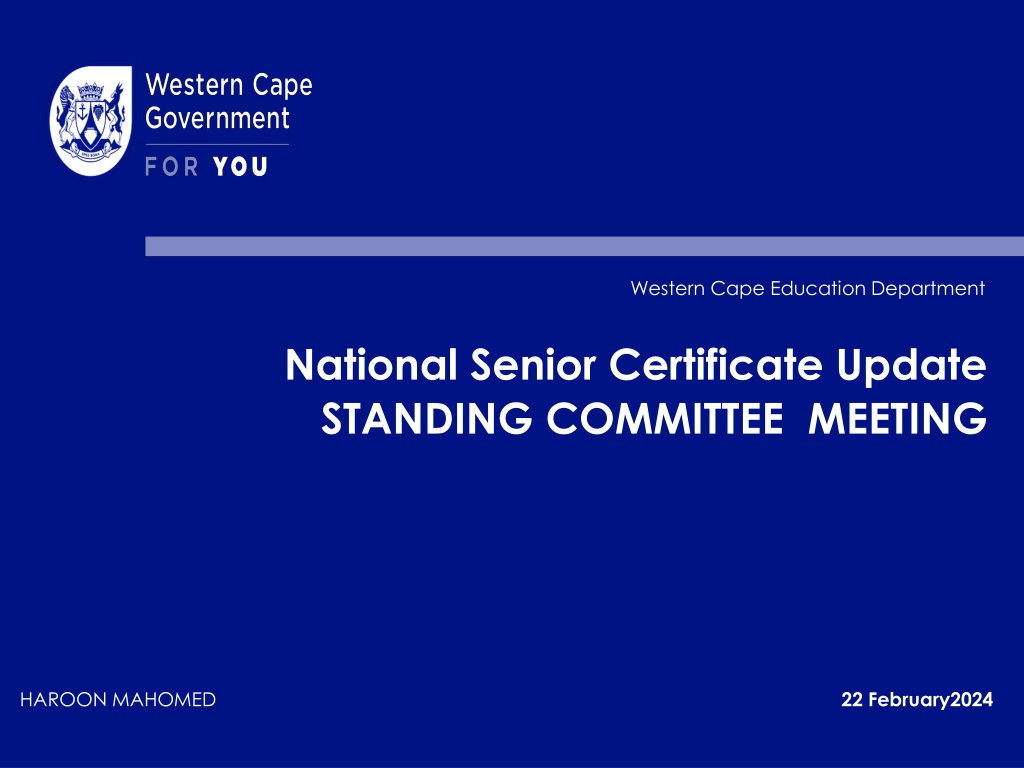
 undefined
undefined






